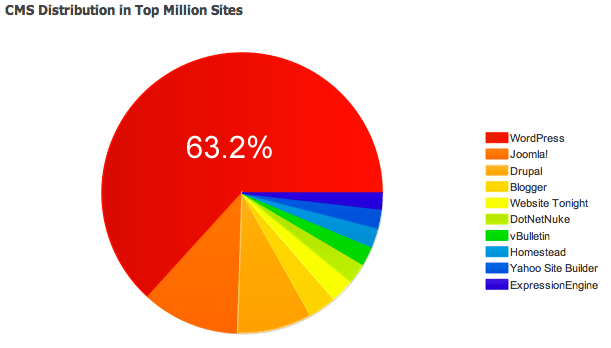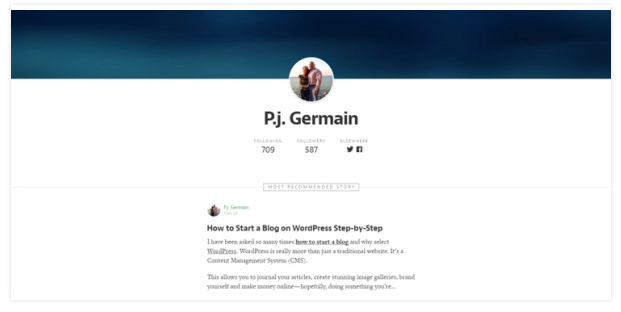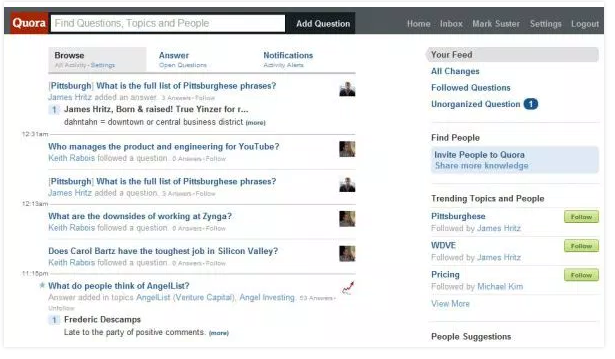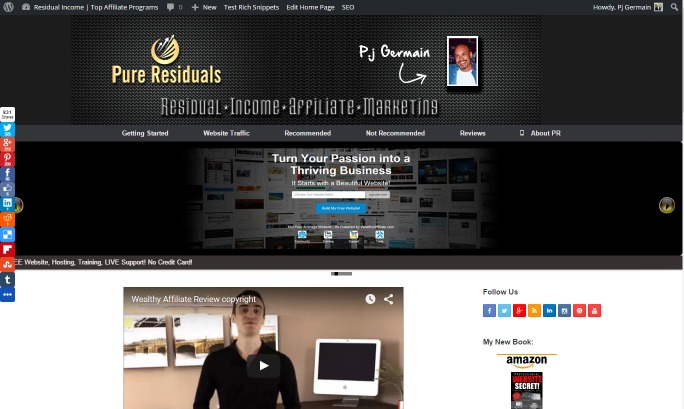The Top 5 Best Blogging Platforms
Whenever someone asks me how I’m earning an extra paycheck online, the question eventually comes around to “Okay, P.j., but What is a Blog?” Well, before diving into the top of the Best Blogging Platforms for 2021, let’s discuss the definition of a “Blog”.
The term, blob originated in the early 1900s as a shortened form of “weblog”. A blog is simply like an online journal. It is a website, but generally is frequently updated by one person or a team of “bloggers” and is typically written in a conversational style and somewhat informal. A blog can stand on it’s own or be a part of a larger website.
As you’re likely aware, blogging has been around for quite awhile. Most recently though, it has gained some considerable traction as one of the best forms for gaining organic natural search engine notice. Blogs can help a boring or mundane website become a dynamic, engaging website traffic churning machine. Google, Bing and Yahoo – the three major search engines love to see unique, engaging high quality content in any niche market. Also, blogs allow personal opinion, consumer reviews and help regular people like you and me become an authority in any niche very quickly – branding yourself or your product or services. This helps create relationship building and when accompanied by email marketing and solid landing pages can drastically increase online revenue.
Why Should Anyone Use the Top 5 Best Blogging Platforms?
HTML (hypertext markup language), CSS (cascading style sheets) and JS (Javascript) can take years to learn to proficiency and even more so to master. Blogging platforms are built to be intuitive and easy to use. The learning curve is quite short if you consider yourself fairly good with technology. Even if you don’t have a traditional website, the following blogging platforms can help you create a professional online presence in a jiffy. If you DO have a traditional website for your business, blogging platforms can help your SEO in a major way with anchor texts (backlinks) and more exposure.
Blogging has evolved to become a vital tool for medium and small businesses. Used within a solid content marketing strategy, blogging can quickly vault a before unknown business into the limelight in record time. Also, the following best blogging platforms of 2015 all have their social media sharing options built right in to help spread the word about your products or services and help get your backlinks indexed much quicker.
Who is the Best Blogging Platforms Intended for?
Well, as aforementioned, blogging is geared more towards small to medium businesses with a lower budget. So, it’s great for the novice online marketer. But, also used for SEO by many intermediate and professional content marketers and SEO experts that I’ve talked to or worked with.
Thereby, blogging is really open to anyone and when setup correctly, an effective tool for all websites. Now, keep in mind, you don’t want to neglect your primary site. Blogging can be used to help stimulate growth, gain exposure and build leads. These top 5 blogging platforms should be used in conjunction with your primary website. While the number 1 platform that I’ll introduce you to CAN and does a fantastic job of standing on its own.
The Top 5 Best Blogging Platforms for 2018
Generally, I’ll list and explain things in ascending order. But, for this article, I’m going against my norm. Let’s start with Number 5….
 The Google Blogger Platform
The Google Blogger Platform
Many will disagree with me on this, but the Google Blogger platform came in at number 5 on my best blogging platforms review simply because it’s lack of flexibility. It is a powerful platform with a very easy intuitive interface, but there are very few “plug-ins” to avail the user to more features as others.
Blogger was first released as “Blogspot”, but then after purchased by Google, became known as Blogger. Generally, you’re free version is setup as a domain off the main blogger.com website. But, you can avoid that distinctive newbie appearance by purchasing your own professional domain name and pointing it to your new Blogger blog/website if you wish. Be sure to read by article on How to Choose a Domain Name Your Clients will Love.
Of course, having the Google backing, these websites or blogs are easily setup via your Google Login and gain quick Google Search indexing. There are some free built-in templates to choose from, but editing the templates and the number of templates available leaves much to be desired. Additionally, the program itself is in dire need of another upgrade. It’s simply not as responsive as some of the others that made the Top 5 blogging platforms review.

While being owned by Google sounds great at first, they are also very strict about certain aspects of your blogs and can lay down the hammer anytime they wish. This is also one of the cons of earning money via Google Adsense (one half of their pay per click model). Beyond that, should you decide to sell your website later (which could earn you considerable money – known as domain flipping) you can’t do this with a Blogger blog. This is a major problem for me and many other professional website (firtual
Pros:
- Short learning curve
- Intuitive interface and good for long articles
- Easy Google Adsense and Google Analytics integration
Cons:
- Limited flexibility with few templates and plug-ins
- 100% Google Owned
- No chance to flip the domain later (sell the website)
Summary: Blogger is a fantastic way to begin to get your feel about how blogging works in general. Also, it works great as a simple personal website platform, but many would say that it really lacks the features of being a real deal professional website.

Medium – Many of the newer blogging platform have gone away from the cluttered sidebars and advertisement filled spaces that take up literally every inch of virtual real estate and gone to more of a minimalist approach giving us a more clean and crisp experience. My OCD loves this approach and it certainly makes image really pop. Medium has adopted this new trend and is growing strong in popularity. The founds of Twitter – Stone and Evan Williams have also encoded the Medium platform with an “upvote” social option for their blogging posts much like Digg and Reddit.
While Medium has only been around since 2012, it’s gained a huge following by both bloggers and professionals as well as the search engines. Creating a new account on Medium is painless and fast and the interface can be used by any non-techy type. With the clean and clear appearance of a Medium blog, it is also well suited for a professional web presence right out of the gate. But, as you will see once you get into it, it has more of a showcase feel for professionals to premiere their works.
The first thing you notice in Medium is the total absence of advertisements, pop-ups or banners. It’s minimalist approach is enticing and centers your information up front and enhanced.
Okay, so what is good and bad about using the Medium blogging platform?
Pros
- Clean and clean design layout
- No tech skills needed
- Nice social interface with other users
- Rapidly gaining ground as a solid blogging platform
Cons
- Little or no customization
- Discover and search mechanisms need work
Summary – As with Blogger, Medium is a great place to get your feet wet in the bloggosphere. It’s nice for a professional appearance and much more responsive than Blogger. Online marketing, affiliate marketers and the like would be best using Medium as a secondary platform.

Tumblr – With over 100 BILLION blog posts and over 220 Million actual blogs, Tumblr has made it’s way into the history books as likely the largest used micro-blogging platform overall. Recently purchased by Yahoo for a mere $1 Billion, Tumblr received a face lift and heavily used by both teenagers and beginning bloggers to post their very first blog subsequent to the registration process which takes mere seconds.
The Tumblr micro-blog platform includes more of the higher end features of a fully functional and professional blog setting itself apart, but accompanied by Twitter type mechanisms. The new appearance of Tumblr is much more responsive and professional than in the past which was quite the “grunge” look. While in our opinion, Tumblr isn’t a solid professional blogging platform, it is free and again can help you determine if your a born natural blogger.
Pros:
- Terrific Micro-blogging platform with Twitter-type feature
- Fast Start and Easy to use
Cons:
- Not really a professional presentation
- Owned by Yahoo – MAY be inundated with advertisements soon
- Not a clean approach for long articles
Summary: Tumblr is terrible for long articles, but easy to get started with almost a zero learning curve. The sharing app is cute and animated, but seems to be more tuned for a younger audience. Be brief or find something else.
Quora – If you like the Q&A platform, you’re going to love Quora. This site is raging with tremendous momentum in the online marketplace. You can quickly setup an account, tweak your profile and get out there and ask questions and, more so, answer questions to develop your brand and show yourself as an authority in your favorite niche market. When we first began using Quora, we noticed our responses to questions were indexed nearly in real time! There is some amazing speed and notice from the major search engines. Quora is one of the best places online line for networking with others, relationship building and online reputation.
While it is a powerful authority platform, mainly for Q&A, the blogging side of Quora isn’t for the faint hearted. It took us a bit of time to learn how to insert images and tweak our anchor text effectively. That being said, if you can get past the techy part, the average Quora member gains over 30,000 page views on their author profile. That is far and above the other Top Blogging Platforms mentioned. But again, remember, most of the membership are professionals and well-versed in writing and the “gift of gab”.
Pros:
Active and Dynamic community atmosphere with solid professional profile features
Variety of niche market topics in which to choose from
Topic Editing function like major Wiki sites
Links are indexed almost immediately
Cons:
Unlike the other blogging platforms reviewed, Quora isn’t really suitable for personal blogs
Customization is limited and the learning curve on simple images and anchor text can be daunting
Summary: The Quora blogging platform is best suited for topic matter experts, technical gurus and other professionals. It is fantastic for relationship building, authority, branding yourself and SEO indexing, but can be difficult to use for most people.

Okay, and now the moment you’ve been waiting for (unless of course, you just skimmed down to this section). The Number 1 Best Blogging Platform of 2018
WordPress – Still the reigning king, WordPress now powers nearly 20 percent of all websites on the Internet. The source code has been downloaded more than 46 Million times.
 25% of all WordPress users make a FULL-TIME living off their websites.
25% of all WordPress users make a FULL-TIME living off their websites.
But, WordPress is not simply a blogging platform. It’s a fully blown CMS – Content Management System designed to help businesses or individuals combine articles, videos, documents and more in a collaborative environment. Additionally, this high-powered CMS is suitable for newbies, intermediate and advanced geeks alike. And, talk about flexibility, there are over 34,000 “plug-ins” to enhance your WordPress experience and tailor to your needs and wants. Beyond that, you could grow old trying to decide between which of the free or paid premium templates you want to use to showcase your business or personal website.

WordPress blogs receive a stout 5.5 Million comments each and every month and that is growing. There are 37 Million global searches for WordPress and a combined total traffic of 14.7 Billion page views on this platform. Released just over 12 years ago, WordPress took the Internet by storm and continues to flourish.
Important Note: WordPress is Free to use and can be had easily from WordPress.com, there own hosted platform on their servers. But, you can also download the source code for free from WordPress.ORG and install it on the hosting service of your choice. The major difference being that the WordPress.com version is limited and will later require a few fees to upgrade and gain full use of all the facets that make up this incredible CMS.
Beyond this, not only is WordPress impressive out of the box, it’s a very professional front end for forums, membership sites, team collaborations, eCommerce and social interaction. Additionally, because of it’s CMS nature, it’s nearly perfectly setup for search engine optimization without lifting a finger.
Hosting your own WordPress website on the hosting provider of your choice is do-able if you’re somewhat technically inclined. You can get optimized WordPress hosting via Bluehost for about $12 per month. Yep, you could find it cheaper, but trust me, I’ve tried “cheap” and you get what you pay for. Bluehost is solid. If you’re not so technically inclined and want a quick WordPress setup that is Free out of the gate with zero cost backups, virus scanning and more, read on!
Okay, let’s get to the meat of this blogging platforms pros and cons:
Pros
- Extremely Customization – features and design
- Scale-able
- Huge community support on WordPress.org and other venues
- Easy to learn with WYSIWYG editor
Cons
- Can get a bit complicated when scaling up
Summary: The WordPress CMS is a well-oiled and tweaked machine for small, medium or large businesses, individual bloggers, professionals and more. There is no other entity with the support and customization available. WordPress developers are easy to find and if you wish to self-host it, Bluehost is the best around. Hosting your own website on the WordPress hosting provider of your choice is do-able if you’re somewhat technically inclined.
Best Blogging Platforms Conclusion:
WordPress simply crushes the competition. But, if you’re looking to for the Top Affiliate Program and perhaps have the desire to join the best online opportunity with free Live support and a fully featured WordPress website, then look no further than the Pure Residuals #1 Rated business opportunity and check out our Wealthy Affiliate Review. You’ll learn WordPress from the basic foundations of niche selection to online marketing and content marketing strategies. WordPress will be setup for you immediately and you’ll gain access to the largest and most well-respected business community available.
All of this is absolutely free. No Credit Card Needed!




 The Google Blogger Platform
The Google Blogger Platform










